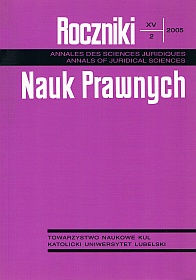The Motive of a Judicial Petition to the Second Section of Apostolic Signature
Abstract
The legal regulation with regard to administrative justice originated by Paul VI sought to establish a network of local administrative courts. This was according to the postulate contained in the Principles approved by the Synod of Bishops in 1967. The new vision of administrative justice in the Church was reflected in the apostolic constitution of Pope Paul VI Regimini Ecclesiae Universae. Owing to the division of the Signature into two sections, an administrative tribunal was established at the highest level of power, but no tribunals of lower instances were established. This was supposed to be only a transitory solution.
According to the Regimini Ecclesiae Universae, one could refer the administrative acts to the tribunal of the second section of the Apostolic Signature. This process of appeal depended to a large extent on how broadly was understood the motive of petition pointed in art. 106: “anytime it is claimed that the act itself has violated a law.” On the importance of the term violatio legis, as it is used in art. 106, there are various opinions, both in the teaching of law and in practice. The discrepancy made the Congregation for the Clergy to turn to the Papal Commission for Interpretation with request to explain any doubts. In the course of a discussion on the meaning of violatio legis one may therefore list two stages: the first one – from the promulgation of the constitution Regimini Ecclesiae Universae to the announcement of an answer from the Papal Commission for Interpretation; the second one – after the answer has been announced.
It is extremely difficult to find a motive of judicial petition to the second section of the Apostolic Signature only on the basis of the current Code, since it contains no canons devoted to this issue. The current Code contains only a general norm defining the range of competence of the tribunal of the second section of the Apostolic Signature. This does not change the fact that the norms contained in the Code are an enormous progress in relation to the older law, especially in the domain of administration. The new Code contributed to a definition of the motive of petition (petitum) to the second section, among other things, by making precise the concept of particular administrative act.
The development of the Apostolic Signature was much affected by the issue of the apostolic constitution Pastor Bonus, a constitution that crowned the post-conciliar regeneration of the Roman Curia. By virtue of art. 123 of this Constitution, the tribunal of the second section of the Apostolic Signature is competent to deal with petitions against particular administrative acts, issued or approved by the dicasteries of the Roman Curia. The motive of the judicial petition to the second section of the Apostolic Signature may be only illegality of an act, i.e. violation of a law in procedure (in procedure), which should be kept on issuing such an act, or else in the very decision inherent in it (in decernendo). According to par. 2 art. 123 Pastor Bonus the Signature, apart from its illegality, may decided the question with regard to the redressing of the wrongs that result from an illegal act. The condition to accept the petition is to file it within thirty useful days.
Copyright (c) 2005 Roczniki Nauk Prawnych

This work is licensed under a Creative Commons Attribution-NonCommercial-NoDerivatives 4.0 International License.


